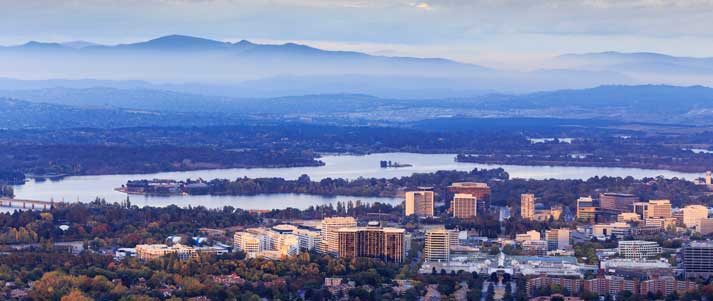Studying abroad in Australia
Fancy doing your degree down under? If you want to turn that Aussie dream into a reality, here's how to do it and, most importantly, how much it will cost you...

If the cute, cap-wearing koala hasn't convinced you already, there are plenty of reasons why studying in Australia is a great idea.
As well as being widely considered one of the best destinations for international students in the world, the land down under boasts postcard beaches, buzzing cities, a diverse student population and some seriously prestigious universities.
But figuring out exactly how you get there isn't so easy. We've put together everything you could possibly need to know, covering visas, insurance and how much it will cost to head to Australia.
How to study in Australia
- Why study in Australia?
- The pros and cons of studying in Australia
- Best student cities in Australia
- Studying in Australia as a UK citizen
- Financial support for international students in Australia
- Australian student visas
- Can you work on an Australian student visa?
- Extending your Australian student visa
- How to apply for student health insurance
- Other expenses to consider
Why study in Australia?
There's a reason Australia is such a popular study destination for students, as well as being a common emigration spot for Brits after graduation.
You can get lots of sunshine, high quality of life, and everything from the Sydney Opera House to the Great Barrier Reef to explore in your spare time.
It's got huge cultural diversity, but it's also an English-speaking country if you're worried about language barriers. Plus, it has more than 40 universities, including some of the best in the world, with over 22,000 courses to choose from.
The Australian National University ranks highly as one of the best universities in the world and has two Australian Prime Ministers among its alumni.
The likes of the University of Melbourne (the country's oldest university) and the University of New South Wales are also internationally respected and part of the Group of Eight (Go8), a coalition of the country's world-leading research-intensive universities.
While studying in Australia, you'll also be able to explore one of the most beautiful countries in the world. Annabel, who studied at the University of Leeds, spent a year studying at Griffith University in Brisbane as part of her degree.
I loved the chance to live in an amazing country with so many opportunities to travel. Being based on the Gold Coast, I took full advantage of the outdoor lifestyle, spending endless days walking and sunbathing at the beach.
But, just like everywhere, Australia also has its downsides. If you're trying to decide whether it's right for you, here are some pros and cons of studying in Australia:
Pros of studying abroad in Australia
There are tons of pros of studying in Australia, including:
- You'll receive a high-quality education
- Australia is home to some amazing food
- The smaller population means areas tend to be less busy
- The beaches.
Cons of studying abroad in Australia
Here are the downsides of studying abroad in Australia:
- It can be quite expensive, so make sure you find cheap flights
- If you start to miss home, it won't be easy to pop over, but you can use our tips on how to deal with homesickness
- In certain industries, the job prospects in Australia aren't great
- It gets seriously hot – which can be difficult to adjust to if you're used to the British climate.
Best student cities in Australia
Here are some of the best Australian cities to live in as a student:
-
Melbourne

- Good for: Diverse student population
- Bad for: Expensive living costs.
If you want to study in Australia, Melbourne is often ranked as the best place to do so.
It's known as the country's cultural capital, with plenty of live music, theatre, comedy and sports to keep you entertained on the weekends. It's also known for having a multicultural population, a very high standard of living and some pretty gorgeous beaches.
It also has a whopping nine universities, and over 300,000 students living there, so it's a great choice if you want to live in a thriving student community.
The University of Melbourne and Monash University are the city's highest-ranked institutions, and some of the best in the world.
-
Sydney
- Good for: Strong employment prospects
- Bad for: The highest rent prices in Australia.
Sydney is Australia's largest city, and also the business and financial hub of the country.
It ranks as one of the best student cities in the world, with a really high quality of living, lots of stunning beaches and open green spaces.
The city is home to six universities and around 300,000 students, almost 100,000 of whom are from overseas, meaning that you certainly won't be alone as an international student.
The University of Sydney and the University of New South Wales are regarded as the city's best.
-
Brisbane
- Good for: Weekend exploring
- Bad for: Getting seriously HOT.
Based in the East of the country, Brisbane is situated close to the Gold Coast and is a super popular tourist spot as a result.
Now the third-largest city in Australia, it's an up-and-coming destination that has developed rapidly in recent years.
If you enjoy getting out into nature, Brisbane has gorgeous coastlines and hiking trails right on its doorstep.
It has two main unis, the highest-ranked of which is the University of Queensland.
-
Canberra

Credit: Chadwick Clark - Shutterstock
- Good for: A more laid-back and less crowded vibe
- Bad for: Being far away from beaches.
Canberra is the capital city of Australia, and it's where Parliament is based. Why here and not Melbourne or Sydney? Both major cities were vying for 'capital' status, so to solve the rivalry, they placed the capital in Canberra instead, conveniently located right in between the two.
The city is based further inland than other Aussie cities, so it isn't the best option if you're looking for beaches on your doorstep.
However, it's home to the Australian National University, one of the top universities in the country. So it's definitely a good place to go if you're looking for academic prestige.
-
Adelaide
- Good for: Lower accommodation costs.
- Bad for: Fewer job opportunities.
Adelaide has a bit of everything – lots of open spaces, beaches and parks, and close proximity to gorgeous islands, vineyards and the Adelaide Hills.
It's also home to some universities, the best of which are the University of Adelaide, the University of South Australia and Flinders University.
Studying in Australia as a UK citizen
Here are your options to study in Australia from the UK:
Undergraduate
It is possible to study for your undergraduate degree at an Australian university, but it's seriously expensive.
Australian tuition fees are among the most expensive in the world, at around $20,000 – $45,000 (around £10,500 – £23,700) a year for international students.
However, tuition fees do vary across institutions and courses, and you should expect to pay more for high-value courses like Medicine and Veterinary Science.
Entry requirements are usually pretty similar to what would be expected by UK universities, but check with your individual institution. Also, although most Australian qualifications are globally recognised, make sure your specific degree will be recognised wherever you choose to work afterwards.
Before you're accepted, you'll need to provide evidence of your academic achievements, your English language proficiency, your ability to support yourself financially for the duration of the course and your health insurance.
Send your applications directly to the university. Once you're accepted, you'll receive a Letter of Offer and an electronic Confirmation of Enrolment, which will enable you to move on to step two – getting a student visa.
Year abroad
If you're looking to study in Australia, doing so via a year abroad is probably the easiest (and cheapest) way to go.
Keep in mind that you'll need to be studying at a university with links to an Australian institution, so you might want to check this when applying to a UK uni if it's something you've got your heart set on.
You'll have to apply via your Study Abroad Office, and North America and Australia are notoriously the most competitive destinations. So be aware that you're not guaranteed a place – getting a strong grade in your first year helps!
As a year abroad student, you won't pay any money to the Australian 'host' university – you'll usually pay a reduced tuition fee to your home university instead. Some universities may charge ad hoc fees for registration etc., so be prepared for these when budgeting.
You'll also receive a Maintenance Loan to help you pay for rent and other living costs while away.
It's important to remember that you're likely to spend more time travelling and soaking up the culture on a year abroad than you would in the UK. Annabel certainly found this:
I found studying at the Australian university easier in terms of workload and module content, which really gave me the chance to spend time immersing myself in the country and culture. If I had known this before, especially during the first semester, I probably wouldn’t have worried about my studies as much as I did.
When does university start in Australia?
While university in the UK runs from September to June, in Australia it runs from around February to November, split into two semesters.
This means if you're studying in Australia for a year, you'll likely start at the beginning of semester two in July/August and finish at the end of semester one in June/July. You'll get a big chunk of time off around December and January (Australian summer).
You'll miss out on your British summer, but if you're in Australia, will you really care?
Postgraduate
You can study for a master's degree or PhD at an Australian university, but again, this will be expensive and you're not guaranteed any financial support. You could be looking at around £12,000 – £21,000 a year.
An MA usually lasts one or two years, and you'll typically need a strong grade in your undergraduate degree to get accepted. As mentioned, Australia is home to some globally respected and recognised universities, so it is a strong choice for a postgraduate qualification.
Financial support for international students in Australia

Credit: Will – Flickr
If you're looking to study in Australia for your undergraduate or postgraduate degree, and are struggling to find the funds, financial support in the form of scholarships are available but can be difficult to acquire.
The government sets aside millions of dollars each year for the prestigious Australia Awards, enabling "emerging leaders" to study and research in Australian institutions by granting scholarships and bursaries.
Master's and PhD students can apply to individual universities for a Research Training Programme scholarship. These are block grants given to students studying research-intensive degrees.
Finally, individual universities will likely have various other scholarships and grants that you can look into. Head over to the Study Australia website for more information and resources.
Australian student visas
Students apply for a student visa (subclass 500). As long as you're studying at a recognised university, you'll need this visa, regardless of your course or study level.
The visa lasts up to five years and costs around £370. It can also take a couple of months to be processed, so make sure you leave enough time to get this sorted before you're due to fly.
Again, you'll need to provide certain information in order to obtain one. You'll need evidence of your course acceptance, proof you have the finances to support yourself while in the country, English language proficiency, health insurance and no substantial criminal record.
If you wish to bring family members with you on your study abroad, they may be eligible to apply for a visa to accompany you. They are subject to the same assessment level requirements that you are as a student.
Find out more information and apply for an Australian student visa.
Can you work on an Australian student visa?
In January 2022, all work restrictions for student visa holders were removed. This meant that people with a student visa were allowed to work as much as they want due to workforce shortage.
However, from 1st July 2023, work restrictions have been re-introduced. You are now permitted to work up to 48 hours a fortnight with an Australian student visa.
If you are volunteering your time, those hours shouldn't be included in the allowable hours during term time. For this to be the case, it needs to be a genuinely voluntary role for a non-profit organisation, you can't receive money for the work and your main purpose in Australia has to be studying.
If you're studying for a research master's or doctoral degree, the restriction on hours is removed.
Don't forget that the minimum wage in Australia is $23.23 per hour (around £12.20).
Extending your Australian student visa
If you want to extend your visa to remain in Australia for further study or work, you'll be able to apply for a new visa – as long as your student visa doesn't have a 'No further stay' condition.
You might be able to extend your stay in Australia for a number of reasons, including:
- Further study
- Graduation
- A holiday
- Work
- Migration.
Each of these reasons requires a different type of visa and you must submit a new application accordingly.
How to apply for student health insurance

You are required to have health insurance at all times when visiting Australia on your student visa. Specifically, you'll need Overseas Student Health Cover (OSHC), which provides comprehensive medical and hospital insurance for foreign students.
Your university might be able to provide this for you, or you can select an approved provider and pay for the insurance yourself.
If you're spending a year abroad in Australia, OSHC may already be covered by your home university, but make sure to double-check.
In order to submit your visa application, you must provide a receipt or another piece of evidence of your OSHC payment. The OSHC will then begin when you arrive in Australia.
Keep in mind that if you are studying at multiple educational providers, you'll have to ensure that there's no gap between policies from one to the next.
Other expenses to study in Australia
Your visa and health insurance are two of your most important expenses but don't forget that there are other things you'll probably have to fork out for as well, including:
- Return flights to the country (to Australia, they will most likely be over £600)
- More flights for visits home (at Christmas, for example)
- Travelling in Australia during your time abroad
- Emergency funds
- Accommodation
- Course textbooks and any other equipment you may need.
Studying abroad in Australia is a hugely rewarding and fun experience, but depending on how you choose to do it, can be pricey. But then again, who can put a price on cute cuddly koala bears?
If you're not sold on Australia, why not check out the best universities in America?








